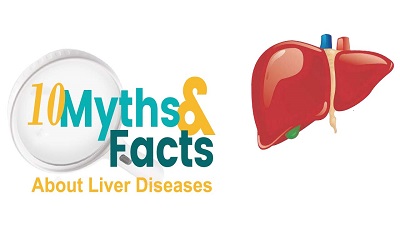Pravin Patole (Transplant Year: 2021)
Treatment : Liver Transplant
Saket Khadakkar (Transplant Year: 2021)
Treatment : Liver Transplant
Pravin Patole (Transplant Year: 2021)
Treatment : Liver Transplant
Saket Khadakkar (Transplant Year: 2021)
Treatment : Liver Transplant
Pravin Patole (Transplant Year: 2021)
Treatment : Liver Transplant
Saket Khadakkar (Transplant Year: 2021)
Treatment : Liver Transplant
Error: Contact form not found.

Liver diseases are usually observed as a “silent” condition, as its various forms can don’t have any symptoms in the slightest degree. In most serious cases, liver disease can result in cirrhosis and cancer. Here’s a glance of 10 of the foremost common preconceptions about liver health.
Liver conditions are often detected with a regular blood test.
FALSE: Doctors rarely prescribe the specific blood tests required to evaluate liver function, which could partly explain the usually very late diagnosis of liver diseases. An underlying problem can’t be detected through transaminase levels alone. Patients also got to be tested for the ASAT and ALAT markers, which may show signs of cell destruction within the liver, as well as alkaline phosphatases, which may detect a reduction in bile secretion from the liver.
Liver problems cause yellow skin and pains.
FALSE: Major kinds of liver diseases usually don’t have any symptoms in the least. Hepatitis A, B and C, also as cirrhosis, are sometimes diagnosed 20 to 30 years later because the liver is known to be “silent.” What may sometimes feel like aches and pains within the liver are usually digestive symptoms caused by rich food or a high-fat diet.
Alcohol is a major reason for liver disease.
TRUE AND FALSE: Eighty per cent of liver conditions are linked to excessive alcohol consumption and hepatitis. Those people who received blood transfusions before 1990 are potentially at a higher risk of hepatitis because the HIV and hepatitis C viruses were unknown at the time. The remaining 20 per cent of liver diseases cases are caused by rare genetic conditions or by a build-up of fat, resulting in “non-alcoholic steatohepatitis.” Being overweight and having diabetes or high cholesterol levels are risk factors for cirrhosis and so-called “fatty liver disease.”
Cirrhosis could be a risk factor for liver cancer.
TRUE: People affected by cirrhosis are in danger of developing cancer of the liver. The five-year survival rate is just 15 percent.
Hepatitis and cirrhosis are often cured.
TRUE AND FALSE: Cirrhosis is often reversed, regardless of what the cause, notably by cutting out alcohol, eating a healthy diet and taking exercise. In 95 percent of cases, hepatitis C can now be cured because of new antiviral agents that kill the virus. The progression of the hepatitis B virus can be halted by two specific drugs, but no cure is currently available. Other drugs are within the process of being tested.
Medication is bad for the liver.
TRUE: All kinds of medication May potentially be potentially toxic for the liver. Elderly individuals following numerous treatments are particularly in danger of drug-induced hepatitis. Health supplements aren’t without risk either. These can also poison the liver when consumed in excessive quantities or if not used correctly.
Spirits are worse for the liver than wine or beer.
FALSE: Liver specialists stress that it is the quantity of alcohol that matters, not the kind of drink. Plus, drinking a glass of water to “compensate” for an alcoholic drink and avoid hangovers isn’t any better for the liver. Similarly, only drinking “good quality” alcoholic drinks may make you feel better, but it doesn’t make the alcohol they contain any less damaging.
Alcohol-free weekdays form up for weekend excess.
FALSE: General recommendations suggest no more than 21 standard glasses or units of alcohol per week for men or 14 glasses per week for ladies, regardless of when it’s consumed. Doctors are concerned about levels of binge drinking, particularly among youngsters, who consume large qualities of alcohol in a very short space of your time.
Coffee is good for the liver.
TRUE: Coffee can be beneficial goodbye as you do not add sugar and do not drink over three or four cups per day. Specialists found a reduced risk of cirrhosis linked to drinking coffee.
Cut out fatty meats, pastries and alcohol to preserve liver function.
TRUE: Nutrition guidelines for liver health are similar to limiting risk factors related to heart diseases. In other words, foods like daily meats, fatty meats like pork and beef, full-fat dairy products, cakes and pastries, chocolate, sweets and sodas should be kept to a minimum. To help preserve liver function, prefer a healthy, balanced diet with lots of fruit, vegetables and protein (white meat, fish, eggs).

Transplantation is a treatment, not a cure. A kidney is an organ that filters waste from the blood and other fluids, and thereby removes it from the body in the form of urine....
Transplantation is a treatment, not a cure. A kidney is an organ that filters waste from the blood and other fluids, and thereby removes it from the body in the form of urine....